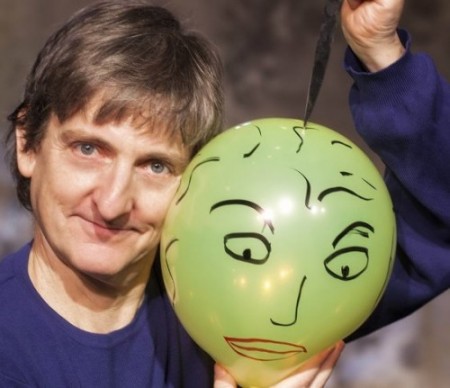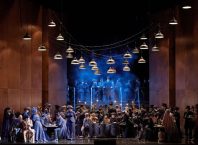The killer has confessed, all that remains is to decide on the verdict. Dor Zweigenbaum admits to having killed his mother – in the one-person play he wrote and performed at Theatronetto 2014, he proceeded to tell the audience why he did it. The verdict? The judges concur: He’s a winner!

In Why I Killed My Mother, directed by Hanoch Reim, Zweigenbaum delivers a gripping, zany, fascinating hyper-talented performance that encompasses mime, dramatic dialogue, movement, puppetry, and song. The well-crafted piece is inscribed in the best of Greek tragic tradition: Matricide is on the program and the audience already knows ‘who dunnit,’ yet the suspenseful and entertaining telling of this tale kept this viewer on the edge of her seat, breathless. Zweigenbaum is a talented actor with the debonair charm and quirky presence of the best of clowns, the ones who know how make us laugh, even as we cry.
The scene is set in court, the props simple: that wooden desk, the one where the defendant always sits in dramas, on that wooden chair. Yet the defense is quite unusual. Zweigenbaum begins without a word spoken, rising from sleep. “I’ll be home for Christmas” the melancholy crooner (not sure if the Bing Crosby or Perry Como recording was used here) sings, as animated snow falls in the background, and the poor outsider hungering for food and warmth, looks through windows and dreams. The sequence ends, and Zweigenbaum speaks for the first time, telling the story of his childhood in Israel and Las Vegas, which is also the story of his mother and their relationship.
It’s a moving story, as Tolstoy said: “All happy families resemble one another, each unhappy family is unhappy in its own way.” But what makes it exceptional, is not the story alone, but its presentation, the way it is told. Theatronetto is a festival of monodramas, and that is a notoriously difficult art form, challenging to write and direct, and for the actor, alone on the stage, carrying an entire play on his or her shoulders. It’s a risky path to take, full of danger.
One problem, for creative team and audiences alike, is to confuse monodramas with monologues. A monologue is a text spoken by a single character in a play, it may be very exciting, entertaining and moving, yet it is part of a whole. A monologue may tell a story, but it does not necessarily have to be a drama. A monodrama is a play performed by one person, yet to be successful it must contain the elements of drama – conflict. A drama is in its essence dialogic, presenting different perspectives, motives and actions. How do you do all that with one actor?
For Zweigenbaum and Reim the answer lies in the question. The temptation in a monodrama, especially one that is centered on a personal story (as this one),is to tell the story entirely from within, from the perspective of the protagonist/narrator. The resulting story may be engaging, but it will be a story rather than a drama. There are different ways to create multiple focal points and perspectives within a monodrama: the actor may take on different personas in the play, or speaking in the role of one character, may let the words of another character be inferred through the response, the soundtrack can also take on a significant role in the drama. This play utilizes several techniques, relying on the many talents of Zweigenbaum as an actor, as he takes on many roles, from family members and teachers, to those in the realm of the fantastic imagination.
Yet the crucial artistic decision here is the understanding that, to paraphrase Rimbaud, ‘I am an other.’ Zweiganbaum not only portrays his past self, the child and youth he once was, as well as the current adult edition, but he also makes explicit the protagonist’s internal conflict. Zweigenbaum’s dialogue and struggle with himself is embodied as well as voiced onstage, providing some of the most emotional moments in the play, as well as some of the wildest and most hilarious. It is this choice that takes the play to a deeper place, beyond the personal story to the universal, as it expresses the core of the conflict: whatever the court may decide, it is the voice of the internal judge that one will always hear.
Dor Zweigenbaum was awarded First Prize at the 2014 Theatronetto Festival for Why I Killed My Mother.
Why I Killed My Mother: written and performed by Dor Zweigenbaum, directed by Hanoch Reim, costumes: Noa Etgar, original music: Kobi Mishal, edited music: Yair Seri, animation: Simone Shor, lighting: Shai Skiba






Chag Sameach Shai! Thank you for writing! The program notes for Theatronetto list Alon, and that was my reference. I’ve updated the article to reflect the correction.
Hello!
I could not agree more with the hails and good reviews, just stopped by to say that there’s an error, and the Lighting Design was done by Shai Skiba and not Alon 🙂
Chag Sameach!
Comments are closed.